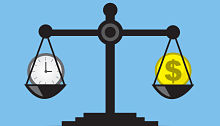
Canadians are choosing to repay their debt over saving for retirement and it appears that this is making them optimistic about being debt free prior to reaching their golden years. However, the reality may prove otherwise, according to two recent studies.
Almost one-third of Canadians would use a lump sum of money, such as their 2015 annual tax return, to pay down debt while fewer than one in 10 Canadians would put that money toward their retirement plans, states the results of recent research from Mississauga, Ont.-based Edward Jones.
Furthermore, it looks like Canadians believe these debt repayment efforts will be rewarded by being debt free prior to retirement. On average, Canadians believe they will have fully repaid their debt by the age of 56, according to a recent study from Toronto-based Canadian Imperial Bank of Commerce (CIBC). Only 21% of respondents think they will be dealing with their debt past the age of 65.
However, the responses of those who are 65 years old or older may be a sobering reality for the optimistic Canadians who think a debt-free retirement lifestyle will be theirs. More than half (56%) of Canadians who have reached retirement age say they still hold debt and, on average, they expect to do so until the age of 70, according to CIBC’s study.
The research also provides another reality check for Canadians between the ages of 25 and 34 as members of this age group believes that, on average, they will be debt-free by the age of 47.
“However, a closer look at those currently carrying debt suggests this may be an optimistic goal, as more than 68% of Canadians 45 and over still carry debt, including 31% who still carry a mortgage,” the CIBC research states.
Still, Canadians are making a concerted effort to settle their debt despite an increasing concern about whether they will have enough income in retirement. Approximately, one-third of Canadians (34%) say having to work longer to supplement their retirement income is their biggest fear, according to Edward Jones’ study.
This is a figure that is only increasing. When this question was asked in 2010, 28% of respondents cited working longer would be their biggest fear and 23% stated this was the case in 2006.
Thus, Canadians should look to establish the right balance between paying down debt and saving for retirement, says Patrick French, director of financial and retirement planning with Edward Jones, in a statement.
“It’s a common dilemma for many Canadians: should I pay down my debt, including my mortgage, or contribute to my retirement savings account? Unfortunately, there’s no easy or definitive answer,” he says. “When carefully factored into an overall financial strategy, a lump sum of money can mean an opportunity to pay off debt and also accumulate retirement savings, but Canadians need to strike the balance that is right for them.”
The responses for Edward Jones’ research came from an online survey of 1,130 Canadians conducted between Feb. 2 and Feb. 5 and a second online survey of 1,574 Canadians between May 25 and May 28.
The CIBC research is derived from the responses of 3,013 Canadian adults who are Angus Reid Forum panellists to an online poll conducted between June 3 and June 5.